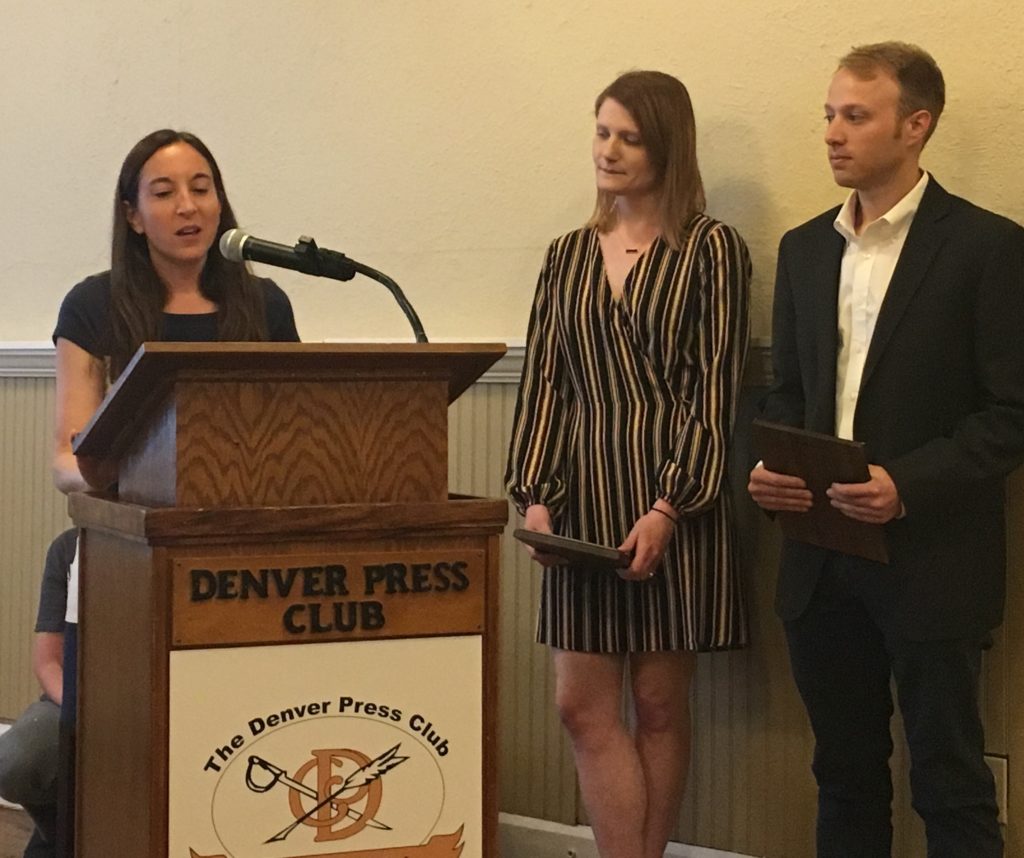Note: A version of this column originally was published by the Brechner Center for Freedom of Information at the University of Florida.
By Jeffrey A. Roberts
CFOIC Executive Director
Internal affairs secrecy contributes to a “code of silence” or “blue wall” in law enforcement, a Denver district court judge wrote in a 2005 decision, “by creating the expectation that things will be kept in house and away from objective outsiders.”
Transparency, on the other hand, enhances public confidence in a police department, concluded Judge Catherine A. Lemon upon ordering the release of an internal affairs file. Knowing they will be scrutinized “makes investigators do a better job and makes them and the department more accountable to the public.”
House Bill 19-1119, passed by the General Assembly and signed into law April 12 by Gov. Jared Polis, will penetrate Colorado’s “blue wall” by opening records on completed internal affairs investigations. Several organizations and people were instrumental in making this happen, including the American Civil Liberties Union of Colorado, the Colorado Freedom of Information Coalition and the bill’s primary sponsors, Rep. James Coleman, D-Denver, and Sen. Mike Foote, D-Lafayette.

But it’s unlikely we would have this important new law without research conducted by University of Denver Sturm College of Law professor Margaret Kwoka and DU law students Bridget DuPey and Christopher McMichael, each of whom received the Colorado Society of Professional Journalists’ First Amendment Award last Friday.
Their 2018 report, “Access Denied,” provided the hard evidence needed to convince state lawmakers that reforms were necessary. Kwoka, DuPey and McMichael requested internal affairs files from 43 law enforcement agencies across the state. Only two showed any willingness to release records to the public.
Such systematic denials (representative of a long-standing practice) leave Coloradans “largely in the dark with regard to allegations and investigations of police misconduct,” the DU researchers wrote, and do not “allow the public to hold law enforcement accountable for their actions.”
“We were even unable to obtain records in cases where an investigation concerned a police-citizen interaction that resulted in a six-figure payout to the aggrieved citizen, but the department ultimately found no wrongdoing,” Kwoka and several other DU law school professors told Polis in a letter urging him to sign the bill.
Perhaps the study’s most startling finding: Many agencies blatantly ignored Colorado Supreme Court rulings that require law enforcement agencies to weigh various interests – including the public interest – on a case-by-case basis before denying access to criminal justice records. “Many agencies categorically deny access to (internal affairs) files without regard to the public interest in a particular file,” the DU study says.
When they asked for specific files, 40 percent of agencies denied access by never responding to their requests. Another 40 percent responded with categorial denials, some using “the same or remarkably similar language … so much so that it was difficult to spot differences between the letters.”
Kwoka presented the law school’s findings to state lawmakers during committee hearings in both houses of the Colorado legislature.
“I think the data really balanced the emotional appeal” for HB 19-1119, said Jill Farschman, CEO of the Colorado Press Association, which also worked for passage of the bill. “It was strong and very persuasive.”
Also key to the measure’s success was a follow-up study, conducted for CFOIC by DU law student Brittany Garza, that demonstrated relatively easy access to police internal affairs files in several other states. “In my research and communications with police departments, requesting internal affairs files seemed almost as routine as requesting a traffic accident report, irrespective of prior criminal proceedings or press coverage,” Garza wrote.
The bill that ultimately became law establishes a statewide presumption of openness for records about the job performance of law enforcement officers. It includes some limitations, however, designed to accommodate the concerns of police chiefs, the district attorneys’ council and the state municipal league, all of which took a neutral position.
HB 19-1119 applies only to records of internal affairs investigations “related to a specific, identifiable incident of alleged misconduct involving a member of the public” while an officer is in uniform or on-duty. It requires the redaction of certain information and allows certain other information to be blacked out. It applies only to internal investigations initiated after the bill’s effective date, and it allows records custodians to first provide a summary of an internal affairs file.
Still, HB 19-1119 is “a huge moment for police transparency and accountability in Colorado,” as Colorado Independent reporter Alex Burness wrote on Twitter, urging fellow journalists to make use of the new law. “We can vastly expand the public’s understanding of how Colorado cops hold one another accountable – or perhaps more importantly, how they might fail to do so. Let the open records requests flow.”
Follow the Colorado Freedom of Information Coalition on Twitter @CoFOIC. Like CFOIC’s Facebook page. Do you appreciate the information and resources provided by CFOIC? Please consider making a tax-deductible donation.




